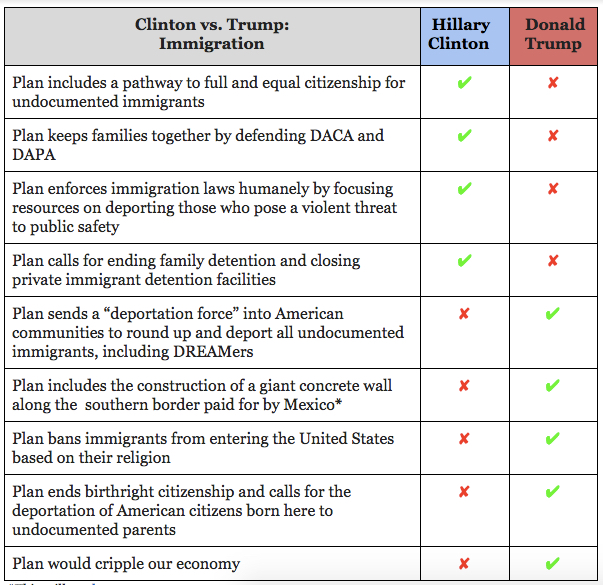
Clinton Will Fight for Comprehensive Immigration Reform, Trump Will Deport 16 Million People
In her first 100 days, Hillary Clinton will put forward a comprehensive immigration reform proposal that includes a pathway to full and equal citizenship. While Clinton will fight to strengthen families, our economy and our country through immigration reform, Donald Trump’s immigration plan remains the same as it’s always been: build a wall, tear apart families and send a “deportation force” into American communities to forcibly remove 16 million people from the United States.

*This will not happen.
Hillary will work to fix our broken immigration system and stay true to our fundamental American values. She has long been a supporter of comprehensive immigration reform. As Senator, Hillary cosponsored Senator Ted Kennedy’s 2004 bill and voted for comprehensive immigration reform bills in 2006 and 2007.
As president, Hillary will:
- Introduce comprehensive immigration reform within her first 100 days that includes a pathway to full and equal citizenship for undocumented immigrants.
- Defend President Obama’s DACA and DAPA executive actions to keep families together.
- Conduct humane, targeted immigration enforcement, including ending family detention and closing private detention centers.
- Promote naturalization by expanding fee waivers to alleviate naturalization costs.
- Support immigrant integration by creating a national Office of Immigrant Affairs.
Donald Trump’s entire campaign has demonized immigrants. Since calling Mexicans “rapists” and “criminals” and, since then, his rhetoric and dangerous immigration policies have only escalated. Trump’s immigration plan would tear apart families and contribute to the loss of nearly 3.5 million jobs in his first term.
As president, Trump has planned to:
- Deport all of the more than 11 million undocumented immigrants in America.
- Repeal birthright citizenship and apply that repeal retroactively to deport the roughly 5 million United States citizens born here to undocumented parents.
- Send a “deportation force” into American communities to round up families.
- Repeal DACA and DAPA on Day One and deport DREAMers.
- Implement a “total and complete shut down of Muslims entering the United States.”
- Build a “big, beautiful wall” along the southern border and pretend Mexico will pay for it (and when he had the opportunity to tell Mexican President Pena Nieto that, he choked).
Trump’s plan would cripple the American economy:
- $4.7 trillion: Amount a policy of mass deportation would reduce cumulative GDP over 10 years.
- $66 billion: Potential loss to U.S. economy under Trump’s “muslim ban” each year.
Nearly 3.5 million jobs: According to Moody’s, Trump’s immigration policies would contribute to the loss of nearly 3.5 million jobs in his first term.
For all the latest, follow our Scheduled Events page and follow Clinton on Twitter, Facebook, YouTube, and Instagram. Also, be sure to subscribe to the campaign’s official Podcast, With Her.

